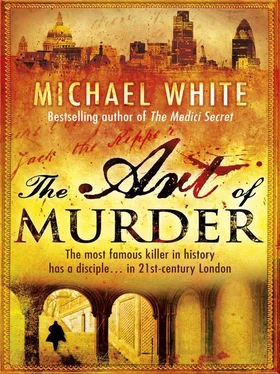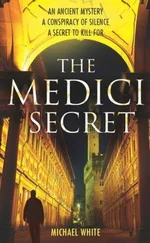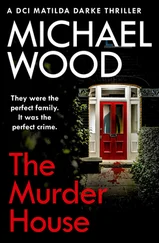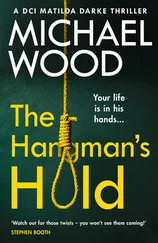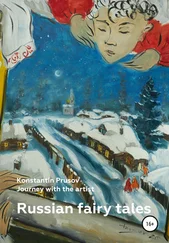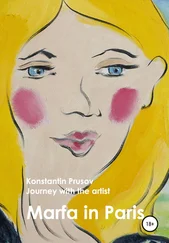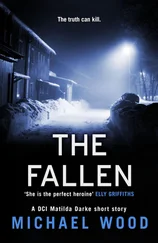Michael White - The Art of Murder
Здесь есть возможность читать онлайн «Michael White - The Art of Murder» весь текст электронной книги совершенно бесплатно (целиком полную версию без сокращений). В некоторых случаях можно слушать аудио, скачать через торрент в формате fb2 и присутствует краткое содержание. Жанр: Триллер, на английском языке. Описание произведения, (предисловие) а так же отзывы посетителей доступны на портале библиотеки ЛибКат.
- Название:The Art of Murder
- Автор:
- Жанр:
- Год:неизвестен
- ISBN:нет данных
- Рейтинг книги:3 / 5. Голосов: 1
-
Избранное:Добавить в избранное
- Отзывы:
-
Ваша оценка:
- 60
- 1
- 2
- 3
- 4
- 5
The Art of Murder: краткое содержание, описание и аннотация
Предлагаем к чтению аннотацию, описание, краткое содержание или предисловие (зависит от того, что написал сам автор книги «The Art of Murder»). Если вы не нашли необходимую информацию о книге — напишите в комментариях, мы постараемся отыскать её.
The Art of Murder — читать онлайн бесплатно полную книгу (весь текст) целиком
Ниже представлен текст книги, разбитый по страницам. Система сохранения места последней прочитанной страницы, позволяет с удобством читать онлайн бесплатно книгу «The Art of Murder», без необходимости каждый раз заново искать на чём Вы остановились. Поставьте закладку, и сможете в любой момент перейти на страницу, на которой закончили чтение.
Интервал:
Закладка:
‘I’ll start in here,’ Turner said. ‘You go through the kitchen and the bathroom. And remember, Roz, every nook and cranny. I don’t want to leave here empty-handed.’
The main room was as oppressive and as cluttered as Turner remembered it from his visit here four days before. The same canvases were stacked along the walls. The easel was empty now; the canvas Arcade had been working on was probably among the others but would have been indistinguishable. A bookcase stood against one wall. Turner walked over to it and began a systematic search, starting at the top left, removing a book, flicking through it and returning it, working his way down to bottom right.
A few minutes later, as he was halfway through the collection of volumes, Sergeant Mackleby emerged from the bathroom. ‘Nothing in there,’ she said. Then stopped at the door to the kitchen. ‘What exactly is it that we’re looking for?’
‘Not sure myself, to be honest,’ he replied. ‘But I’ll know it when I see it.’
‘That’s a great help,’ Roz retorted, and walked into the tiny kitchen.
Jez finished with the books, having found nothing. On the floor were pots of paint and containers sprouting dirty brushes. In one corner lay a rolled-up, paint-splashed sheet, and next to that a pile of old newspapers. Turner went through each pot, lifting the brushes clear of the cleaning fluid. He then emptied the liquid into a spare container, watching the oily paint residue swirl and form a filthy grey-brown mess. The containers concealed no secrets.
He walked over to the window. The tatty curtains were pulled back. He could see flakes of snow drift down, brush the window and dissolve. The road, the buildings and the sky were the colour of the mixed-paint residue. Then he saw himself and the contents of the room reflected in the glass. Beside his right leg, a canvas about two feet square was propped up against the side of the easel with its back to the window. Turner noticed that this one was stretched over a delicate wooden frame. He crouched down and lifted the painting, swivelled it, studied the back of the frame and ran a finger under the edge of the wood where the canvas wrapped around it. He could just get a finger into the gap. There was nothing there.
He put the frame down and picked up one from the top layer of the collection leaning against the walls and the bed. He could hear Roz Mackleby in the kitchen, opening and closing cupboards and shuffling around cereal packets. It was not until the seventh canvas, just when he was beginning to lose heart, that Turner felt a metal object tucked between a wooden strut and the canvas. He managed to wedge another finger into the gap and pulled the object from where it had been nestling. It was a USB portable drive, smaller than his thumb. He lifted it to the light and read the lettering on one side side: Ciscom.Inc. 4Gb.
‘Yes!’ Turner said and smiled to himself.
‘Okay, here we go,’ said Jez Turner as he tapped at the keyboard in Pendragon’s office. The DCI was leaning over his shoulder, staring intently at the screen. The USB drive opened and informed them that it contained two files: one entitled ‘ms’, the other ‘investigations’. He positioned the mouse over ‘ms’ and double-clicked. ‘Ah, password-restricted, naturally.’
‘But you have the password Thursk used,’ Pendragon said.
‘Yeah, but will it work on these files?’ Turner replied and started to tap in NT0658. The file opened. ‘Very sloppy,’ he tutted.
At the top of the first page, it read: The Lost Girl: Life in the Demi-Monde by Noel Thursk. Pendragon glanced at the foot of the page. The document was over fifteen thousand words long.
‘Well, how about that,’ Turner said triumphantly. ‘Thursk had written something after all.’
Pendragon ignored him and scrolled down. The screen became a stream of words. He flicked the mouse and clicked the Print command. ‘Okay, what’s in the other one?’
This file also opened with the same password and a list of dozens of jpegs appeared. They were numbered in ascending order. Turner scrolled down. The last one was number 45.
‘Start at the beginning,’ Pendragon said, and Turner double-clicked the first on the list.
A picture opened on the screen. It was of Kingsley Berrick propped up as the figure in a Magritte painting. Pendragon leaned in and clicked jpeg 002. Noel Thursk’s flattened body draped in the tree appeared. Jpeg 003 showed an equally graphic image of Michael O’Leary.
Turner looked round to Pendragon whose face was close to his, his eyes flicking from side to side as he took in the images on the screen a few inches away. ‘I didn’t think any of the police or forensics pictures had been released to the public,’ he said.
‘They haven’t, Turner.’
Jpeg 004 showed the inside of the warehouse on West India Quay. The next was a close-up of the roller; 006 was a shot of the metal punch.
‘Are these trophies?’ Turner said, his voice icy.
Pendragon pulled himself upright and stood up, arms folded, staring at the screen. ‘No,’ he said as Turner spun round in the chair. ‘They’re something entirely different, Sergeant. And I don’t want a word breathed about this until I’m ready. You got that?’
‘Got it, guv.’
Chapter 40
To Mrs Sonia Thomson
16 October 1888
And so, an interlude. I had, I thought, done exceedingly well. There were certainly a few precarious moments, especially on the night of the double murder. I had seen the whites of the policeman’s eyes before I jumped, and for a fleeting moment I half-believed I had reached the end of the road, with my skull crushed against the tunnel wall or my body shattered under the steel wheels of the underground train. But that was not to be. The worst I suffered was a sprained ankle and a few lacerations and bruises.
But I needed rest. And, to be honest, I wanted to observe at my leisure the repercussions from my adventures. For this was all part of the creative process. As I started work on the painting, building upon my experiences and my almost perfect recall, I sniffed the air, so to speak. I sensed and relished the rising panic and animal fear of the dumb herd around me.
The newspapers were full of it, of course, and I too played my part, offering Archibald suitably sanitised renditions of the slashed bodies. I read with great amusement the inaccuracies and downright fictions concerning what had been dubbed ‘the Whitechapel murders’. There was even a copy-cat murder. A whore named Ann Chapman was dispatched by a rank amateur. I was irritated when I first heard of this, but after a moment’s pause, I realised the truth of the adage that imitation is the highest form of flattery. Then, of course, some of the falsehoods had been initiated by Yours Truly. I was particularly proud of the graffiti I had daubed on the wall close to the body of Elizabeth Stride, and the removal of the kidney, which I had already dug up and used in the preparation of my paints. The message had conveyed a subtle suggestion that the Freemasons might be involved because of the vaguely ritualistic aspect to the murder. It had been another amusing little decoy, just to confuse the Old Bill, as the local ovine community call the noble guardians of the law.
Suspects were rounded up. One unfortunate fellow, a worker in a local abattoir, had the misfortune of being spotted close to the scene of Catherine’s sad demise. He was given the nickname ‘Leather Apron’ because of the garment he wore at work. He was pulled in for questioning and held in the cells for a few days. But he was eventually released because the police had no real evidence with which to present a case.
The police were, by and large, completely ineffectual, I’m pleased to say. I had chosen my theatre well, had I not, Sonia? After all, who gives a damn about a few repulsive, drunken whores? My work was conducted in a part of London which was, in the eyes of most people, beyond the pale. Wealthy gentlemen may have enjoyed visiting the Stew, dipping their toe into Hell and dipping their wicks into very rough receptacles, but that was merely the natural order of things. My victims were those who had fallen over the edge. If London had been portrayed by Hieronymus Bosch, Whitechapel would have been the lowest level of Hell, a place filled with barrels of pitch and fire and brimstone, the bodies of the useless tossed in at will to melt into the universal pit of nothingness. Why should a judge or a police commissioner, a university don or a bishop, care the slightest what happened there?
Читать дальшеИнтервал:
Закладка:
Похожие книги на «The Art of Murder»
Представляем Вашему вниманию похожие книги на «The Art of Murder» списком для выбора. Мы отобрали схожую по названию и смыслу литературу в надежде предоставить читателям больше вариантов отыскать новые, интересные, ещё непрочитанные произведения.
Обсуждение, отзывы о книге «The Art of Murder» и просто собственные мнения читателей. Оставьте ваши комментарии, напишите, что Вы думаете о произведении, его смысле или главных героях. Укажите что конкретно понравилось, а что нет, и почему Вы так считаете.
